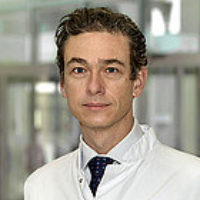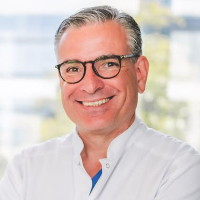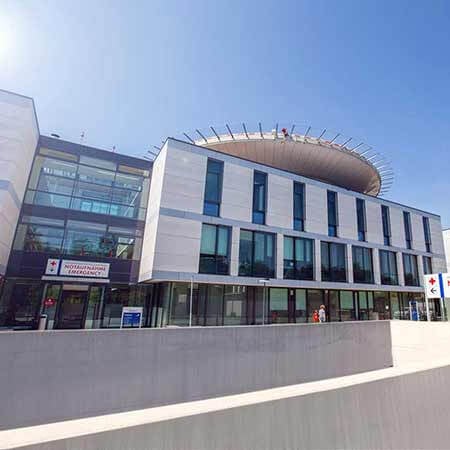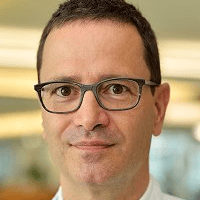Surgical Removal of the Tumor for Glioblastoma (brain Cancer) in Germany
Treatment prices are regulated by national law of the corresponding countries, but can also include additional hospital coefficients. In order to receive the individual cost calculation, please send us the request and medical records.

Department of Adult and Pediatric Neurosurgery, Spinal Surgery
The Department of Adult and Pediatric Neurosurgery, Spinal Surgery offers all the possibilities of modern surgical treatment for diseases of the central and peripheral nervous system in patients of all ages. More than 6,000 surgical procedures are performed annually in the department's high-tech operating rooms. Both planned and emergency neurosurgical procedures are performed here. The department's surgical team focuses on patients with cerebrovascular diseases, brain and skull base tumors, spine and spinal cord diseases, cerebrospinal fluid circulation disorders, and pathologies of the peripheral nervous system. The department's team of physicians also has extensive experience in functional neurosurgery: specialists perform deep brain stimulation for movement disorders, spinal cord stimulation for back pain, and vagus nerve stimulation for epilepsy. The department works closely with neurologists, radiologists, and nuclear medicine specialists to provide patients with the highest level of comprehensive medical care. The department is recognized as one of the top neurosurgical centers in Germany and beyond, as evidenced by consistently high treatment success rates and numerous quality certifications, including the German Cancer Society (DKG) Certificate, the German Spine Society (DWG) Certificate, and the Leading Medicine Guide Certificate.







Department of Neurosurgery and Spinal Surgery
The Department of Neurosurgery and Spinal Surgery offers the full range of modern surgical procedures for patients with diseases of the brain, spinal cord, spine, and peripheral nervous system. The department has state-of-the-art equipment, including navigation systems, monitoring devices, surgical microscopes, intraoperative X-ray diagnostic systems, angiography systems, and laser equipment. In addition, a system for minimally invasive stereotactic interventions has been installed in the department's operating room. The department's neurosurgeons use the latest microsurgical and endoscopic techniques in their work. The medical facility is one of only three in Europe to successfully use the VISUALASE™ device for MRI-guided laser ablation to treat epilepsy. This minimally invasive procedure is highly effective and represents a real breakthrough in epilepsy surgery. The department's neurosurgeons always strive to provide the patient with optimal medical care. They talk in detail about each stage of treatment and are happy to answer the patient's questions. Neurologists and specialists in the field of neuroradiology are often involved in the therapeutic process, which guarantees a comprehensive approach to treatment.


Department of Adult and Pediatric Neurosurgery
The Department of Adult and Pediatric Neurosurgery offers the full range of surgical treatment of diseases of the brain, spine, spinal cord and nerves in adults and children. The department keeps pace with new trends in medicine, as well as contributes significantly to their development. Therefore, the most modern diagnostic and therapeutic methods are available here. An individual approach to each clinical case is crucial to ensure optimal treatment results with the preservation of all neurological functions.

The brain is the most complex structure of the human body. Any type of brain dysfunction can pose a threat to overall health, and its consequences and complications can lead to disability. Brain pathologies are difficult to treat. One of the most dangerous diseases of this kind is a brain tumor process called glioblastoma.
What is glioblastoma?
Glioblastoma is one of the most aggressive and common forms of brain tumors in the central nervous system. It develops inside the cranium. Statistically, for unknown reasons, men are more likely to suffer from glioblastoma.
The causes of such a brain tumor formation are associated with a hereditary predisposition, various genetic defects, the contact with carcinogenic substances, as well as with radiation exposure.
The process of the disease development is characterized by pathological degeneration of cells, which makes them divide randomly, forming a tumor mass. Since brain tumor cells develop from astrocytes, glioblastoma is also called grade 4 astrocytoma.
As it develops and grows, the malignant neoplasm compresses the structures of the brain and invades the surrounding tissues, constantly expanding the area of the lesion. As a result, many neurological deficits develop and intracranial pressure increases, which put the major risk at patients’ lives.
According to statistics, children and adolescents are most susceptible to this type of cancer. It is extremely difficult to establish the cause of the onset of the tumor process in patients.
Oncologists specify such the most common provoking factors:
- Craniocerebral trauma
- Genetic predisposition
- Inflammatory pathologies of the brain (meningitis, encephalitis)
- Chronic viral infections (cytomegalovirus)
- Exposure to chemical carcinogenic substances
Types of brain tumors
Brain tumors are pathological neoplasms in which the growth and differentiation of cells are impaired due to changes in their genetic structure.
Primary tumors originate in the cells of the organ. For example, primary brain tumors occur in brain cells. Besides, there are secondary tumors that originate in other parts of the body but spread (metastasize) to the brain or spinal cord.
Therefore, depending on the origin, glioblastomas can be:
- Primary. Primary glioblastoma develops directly from healthy astrocytes and is much more common. It can develop over several weeks and mainly affects people between the ages of sixty and seventy.
- Secondary. Secondary glioblastoma develops from a lower grade astrocytoma, that is, from an already existing brain tumor consisting of astrocytes. In this case, glioblastoma is the advanced stage of cancer.
Symptoms of glioblastoma
At the early stages of glioblastoma, patients usually do not notice any symptoms. That is why this form of the tumor process is often diagnosed at the advanced stages. In the clinical picture, only nonspecific symptoms appear which are attributed to malaise, lack of sleep, and fatigue. In Germany, doctors pay attention to even minor patients’ complaints, which increases the likelihood of diagnosing a brain tumor at the early stages.
The most pronounced and common symptoms of glioblastoma include:
- Frequent headaches
- Systematic dizziness
- Sudden impairment of sight and hearing
- Sudden onset of speech disorders
- Impairment of memory and cognitive functions
- Various forms of paralysis
- Constant feeling of fatigue
- Regular low body temperature
Diagnostics
The main examinations to verify clinical diagnosis are biopsy, magnetic resonance imaging or computed tomography, positron emission tomography, and a neurological examination.
Brain tumors are often found on occasional examinations when patients are concerned about a different area of the body. When planning a surgery, angiography of the vessels of the brain is performed. In addition to analyses of clinical signs, as well as studying the anamnesis, the diagnosis of the tumor process includes several informative studies, among which the most relevant are:
- Complete blood count and biochemical blood tests
- General urine test
- Coagulogram
- Echocardiography
- Magnetic resonance imaging of the brain
- Positron emission tomography
- Biopsy of the brain tumor with further histological examination (if possible)
The prognosis for patients with glioblastoma depends largely on the timely diagnosis, therefore, the specialists of German clinics pay special attention to the early determination of an accurate diagnosis, as well as to laboratory studies and their interpretation.
Treatment of glioblastoma in Germany
Malignant tumors, including glioblastoma, are more difficult to remove. Most of them require additional treatments beyond surgery, such as radiation therapy, chemotherapy, or participation in clinical trials.
The scheme of glioblastoma treatment is determined by German doctors based on the size of the neoplasm, its localization, presence or absence of metastases, and some other factors. Taking into account the peculiarities of the oncological process, treatment implies the use of the most modern techniques, while verification of the oncological process is carried out using the cutting-edge diagnostic equipment.
The following methods are used in the treatment of glioblastoma:
- Surgery.
The most common types of surgery are craniotomy and skull resection.
During the surgery, the doctor first makes an incision in the scalp. After the incision is made, the surgeon invades the skin and the muscles covering the bones of the skull. The surgeon then uses special instruments to access the brain tumor.
After removing the bone graft, the surgeon opens the dura mater (the tissue that covers the brain) and removes the tumor. The surgeon uses guidance of a computer system for controlling the removal. After removing the brain tumor, the surgeon closes the dura mater. The bone graft may or may not be replaced. In craniotomy, the bone graft is replaced, in resection it is not.
Сraniotomy and resection help reduce the pressure in the skull caused by the tumor and can relieve symptoms and side effects. Those types of surgery also allow the doctor to take a sample of tumor tissue for biopsy.
Whether the surgery can be carried out or not, depends on brain tumor type, which is mostly described by the fact of its spreading.
- Radiation therapy.
Before conducting radiation therapy, complex diagnostics is carried out to confirm the fact of the presence of a tumor of the central nervous system. When deciding to conduct a course of radiation therapy, a further treatment plan is prepared.
The standard treatment for glioblastoma begins with surgery followed by radiation therapy or chemotherapy. Surgery is the first step in the treatment of glioblastoma and it determines the effectiveness of additional therapy. The overall survival of patients with glioblastoma depends directly on the degree of its resection.
The development of new, more effective radiation therapy techniques is performed by studying the possibilities of various irradiation modes based on remote radiation therapy. These are dose escalation, as well as increasing the radiation therapy dose using intraoperative radiation, brachytherapy, stereotaxic radiosurgery, and stereotaxic radiation therapy, that can be presented in the clinical trials.
Clinical trials in particular are an option for the treatment of all types of brain tumors. Therefore, it is important to look for the information about clinical trials as soon as possible, after the diagnosis is confirmed. Sometimes, clinical trials are the most effective option of the treatment of extraordinary glioblastoma cases.
- Chemotherapy.
Chemotherapy involves the use of innovative anticancer drugs, carried out both as part of preoperative and postoperative treatment. If preoperative, chemotherapy is administered to shrink the neoplasm. If postoperative, chemotherapy serves to prevent a relapse.
Glioblastoma, as the most aggressive and malignant type of brain tumors and other neoplasms of the central nervous system, requires high-quality diagnosis and the most effective treatment by competent clinicians. The use of progressive methods and the most modern technology is highly encouraged. Therefore, doctors often suggest the patients participate in clinical trials, if any are available.
You can undergo all of the above, including randomized clinical trials, in Germany. German hospitals use only the latest technologies, up-to-date medical developments while prioritizing patients’ comfort during treatment.
Rehabilitation period
The rehabilitation process after the treatment of glioblastoma is individual in each case. A unique rehabilitation program is elaborated for patients, aimed at alleviating specific symptoms with the most comprehensive techniques to support the restoration of patients’ health.
Cost of treatment in Germany
The cost of treatment in Germany in hospitals listed on the Booking Health website is relatively low. As a rule, you can save up to 30-40% of the initial prices by booking the medical program here.
With Booking Health, you can undergo the treatment of glioblastoma at an affordable price. The cost of treatment in Germany varies, as the prices depend on the hospital, the diagnosis, and the complexity of treatment. The cost of treatment in Germany is in the price range from 21,298 EUR to 37,282 EUR.
Where can I undergo the treatment of glioblastoma in Germany?
Among German hospitals, the best success rates in the treatment of glioblastoma are demonstrated by:
- University Hospital Bergmannsheil Bochum
- Charite University Hospital Berlin
- Beta Klinik Bonn
- University Hospital Freiburg
- University Hospital Frankfurt am Main
How can I undergo glioblastoma treatment in Germany?
Arranging the treatment of brain astrocytoma abroad by oneself can be challenging. It is safer, easier, and less stressful to shift some responsibility onto a medical tourism agency that will support you throughout your journey.
Booking Health will facilitate the organization of treatment in Germany by solving the following issues:
- Translation of the documents and medical reports
- Communication with the hospital
- Assistance in obtaining a visa to Germany
- Booking tickets and transfer
- Accommodation booking in Germany for the period of treatment, or anything related to a comfortable stay in the country
We will also help to find the right medical institution for you. It’s practically not possible to do this on your own, as it requires specific knowledge and experience in medical treatment abroad. It is in our power to do everything to make the treatment in Germany as comfortable as possible.
If you want to get more information on the right hospital for your diagnosis or the cost of treatment in Germany, please leave a request on the Booking Health website. We will contact you as soon as possible, and answer all your questions.

